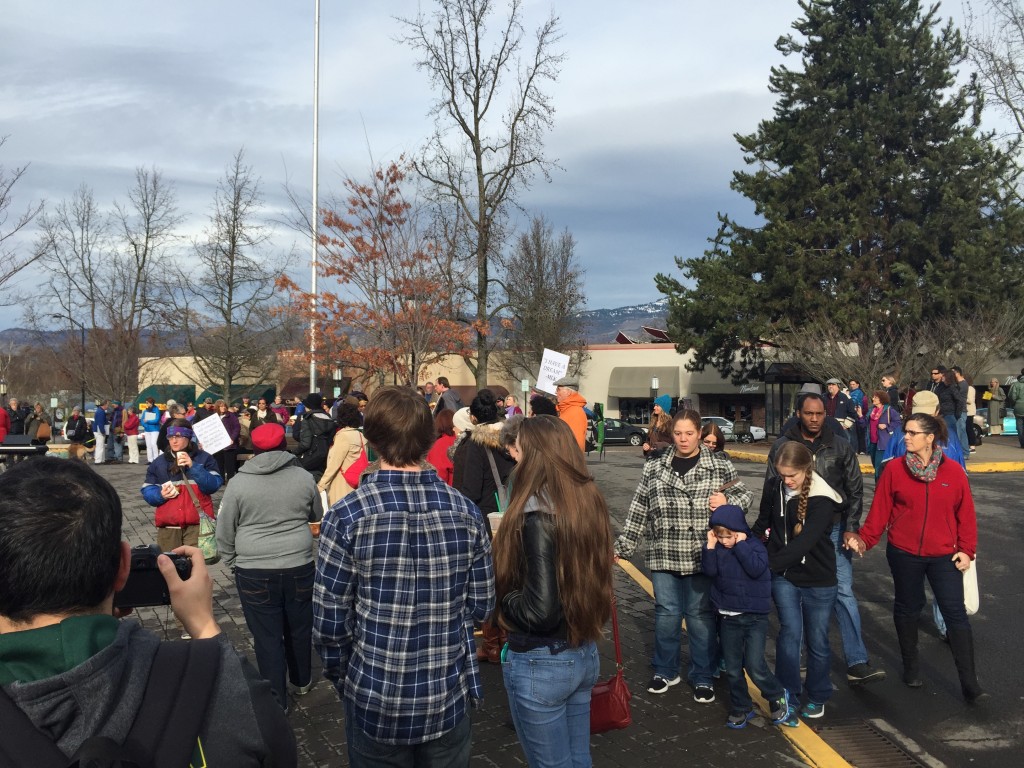
“I am happy to join with you today in what will go down in history as the greatest demonstration for freedom in the history of our nation.” These words, the beginning of Dr. Martin Luther King Jr’s immortal I have a dream speech, rang out Monday as protesters marched and proceeded to occupy downtown Ashland, in the 27th annual Citywide Celebration of MLK day.
The celebration began at the Historic Ashland Armory, where a variety of performances from all across the Rogue valley paid tribute to the late Reverend King’s legacy through music, spoken word, and dance. The celebration culminated with a march downtown.
While 53 years have passed since the Rev. King’s speech on the steps of the Lincoln Memorial, Black rights advocates are still fighting racial inequalities that are enforced in very new ways. Today’s battles are fought against silence, and covert racism, “Back then (during MLK’s civil rights movement) more blatant forms of racism were the norm, and now it’s more covert…Racism has gone into places where white people are not willing to admit that it exists. Where as before it was so blatant you had to recognize it,” said former SOU Black Student Union President and current Executive co-chair for the Oregon Student Equal Rights Alliance, Ahsante Sankofa Foree.
Foree’s comment touch on one of the most prevalent themes of the celebration, Southern Oregon’s lack of acknowledging that racism exists within its communities. The keynote performers of the celebration, the ensemble group Universes, proclaimed the arts in Ashland and the Rogue Valley have “created a false sense of security.” People here are not willing to admit their complacency in allowing racism to continue in their community. In spite of the numerous accounts claiming otherwise.
“There are people that get followed through stores and hassled by police,” said Foree citing some personal examples. Foree also describes a time when, sitting outside of an Oregon Shakespeare Theatre after a show, accompanied by several black friends. Foree claims two Ashland Police Department officers approached and asked the group to leave, citing that the officers had received several complaints. Foree says the officers walked by a group of white kids on skateboards to ask a group of black students to leave who were only sitting and talking. “We often believe that it can’t happen here but it can and has,” said Foree.
Ashland Police Chief Tighe O’Meara, who was present at the event, made clear his desire to better the community and heal the relationship between people of color and the police. “The police are a big part of mending relationships with the community and minorities who have been targeted,” Chief O’Meara said, “We have to be present when police are killing minorities, we have to be part of the conversation and fix things.”
“Offhanded remarks are also a problem. These microaggressions, people try to dismiss them, but they are still agressions… a form of psychological violence. What these messages convey, is you do not belong here and your humanity is not the same as my humanity,” said Foree. “We do live in a town where it’s like ‘well we love all people all lives matter everyone here is equal.’ Then why does this community allow these messages to fester when you are regularly dehumanizing people and letting them know that their feelings don’t matter,” Foree continued.
So how can we as a community face these issues?
“It’s easy to say that there’s no problem,” said SOU Senator of Multicultural Affairs Kathleen Hamilton “So get uncomfortable. Maybe if you get uncomfortable you will learn something.”
“Inform your community,” said Black Student Union, Co-Director of Marketing and Publications, Alexis Phillips, “(people) know about MLK but are blind to the fact that many issues of the 60’s exist today.”
“People are a lot more afraid to be called racists than they are of being racists,” said Foree “if people had the same hesitance to be racist as they are to be called racists, I think this town would be a lot better off.” Foree continued saying “I want to say, a lot of this isn’t born out of people being genuine white supremacists… but people need to move into a space where they can be uncomfortable, and learn that their privilege does affect how they see the world and how to learn and respect that.”
Acknowledgment seems to be a big step in the right direction.



